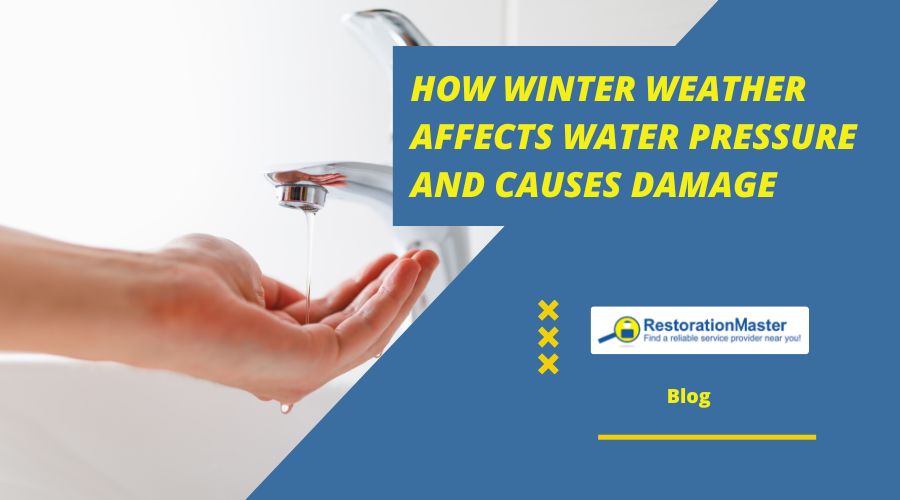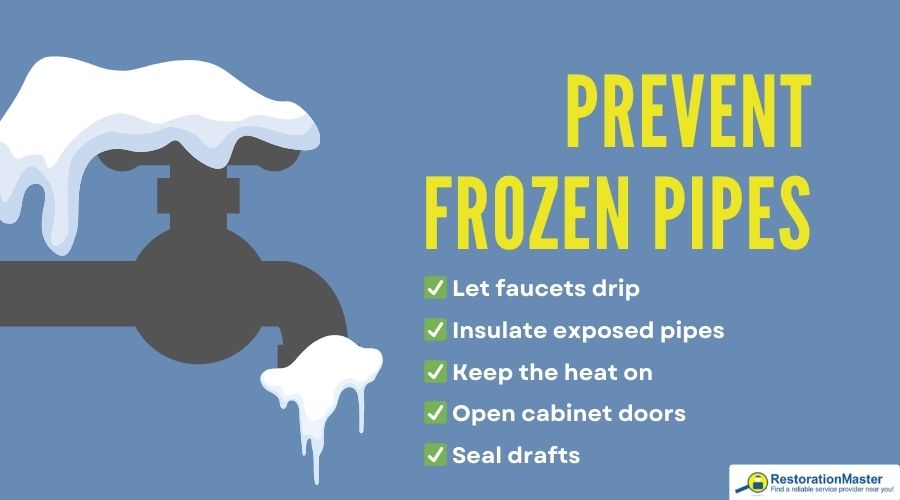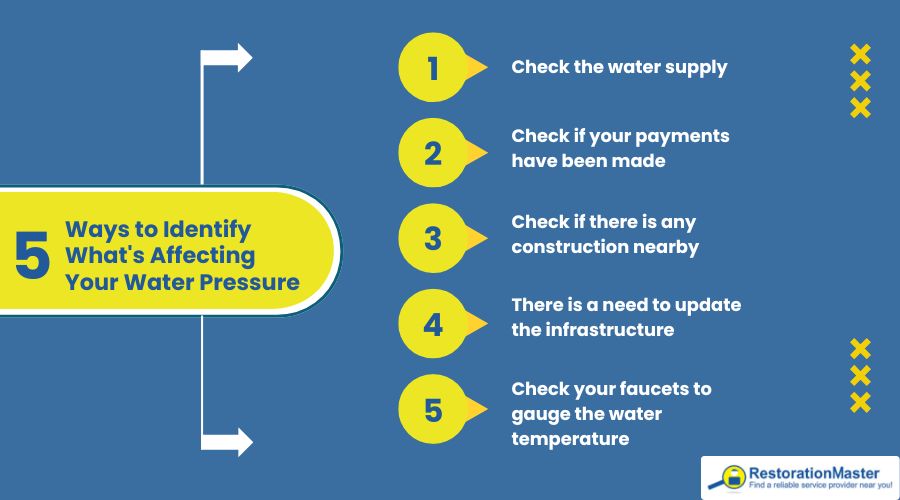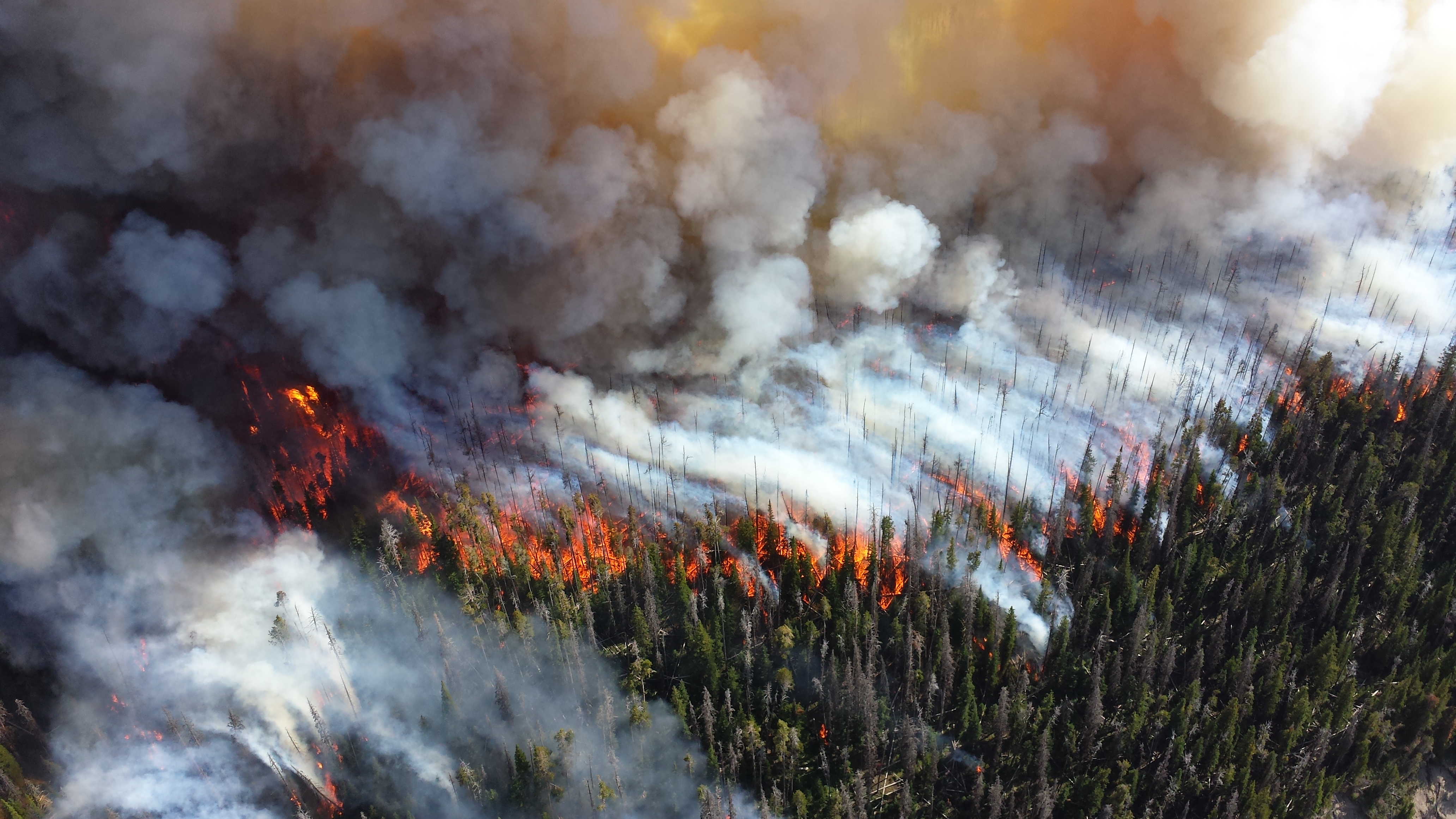How Winter Weather Affects Water Pressure and Causes Damage

Cold weather doesn’t always impact water pressure directly, but it can sometimes leadLead is a heavy metal that can be toxic to humans, especiall... More to a noticeable drop. If you experience reduced water pressure during colder months, it’s important to contact professional plumbers who can identify and resolve the issue. In this article, we’ll explore how cold weather can affect water pressure, share tips to prevent your pipes from freezing, discuss other factors that may influence water pressure, and guide you in pinpointing the cause of pressure changes on your property.
Why does cold weather affect water pressure?
There are various ways that cold weather can affect water pressure. It is important to recognize these issues at your property and react as necessary, so the problem does not get worse.
- Frozen pipes: When temperatures drop, your pipes can freeze, causing the water inside to turn to ice. This not only restricts water flow but can also result in reduced water pressure. If the pipes freeze completely, water flow may stop entirely, or worse, the built-up pressure from the ice can cause the pipes to burst.
- Water expands when it freezes: When water freezes within the pipes, this can restrict water flow and lower the pressure.
- Increase in demand: There may be a heightened demand for water in your area during the winter which may affect your water pressure.
- Decreased water pressure due to showering: If more people in your area are showering around the same time, this could cause a decrease in water pressure.

Tips for Keeping Your Pipes from Freezing
If you live in a region where temperatures regularly drop below 32°F, frozen pipes are a real risk. To protect your pipes from freezing, it’s essential to take these two crucial precautions:
- Always run the heat so that the temperature inside of your property is above freezing.
- Leave your tap (for water) with a slight drip so that water continuously flows within the pipes.
Other Factors That Affect Water Pressure
Understanding the key factors that impact your water pressure is essential for preventing potential issues. Here are some factors other than frozen pipes that can affect your water pressure:
Hard Water
Hard water can reduce water pressure in your home due to its high mineral content. Over time, minerals like calcium and magnesium accumulate in your pipes, creating significant build-up that restricts water flow. Installing a water softener is an effective solutionA solution is a homogeneous mixture of two or more substance... More to prevent hard water deposits and ensure a smooth, uninterrupted flow throughout your home.
Time of day
Water pressure often varies depending on the time of day. It tends to drop during peak usage periods, such as in the morning when many people are showering or in the evening around dinnertime when dishwashers are commonly in use.
Leaky pipes
A leaky pipe can often leadLead is a heavy metal that can be toxic to humans, especiall... More to reduced water pressure, signaling a problem that requires immediate attention. Ignoring the issue could result in significant water damage over time. To prevent costly repairs, it’s crucial to have any suspected leaks inspected promptly by a professional plumber. Don’t delay—addressing the problem early can save you time and money in the long run.
Debris present in the pipes
Clogged pipes can often result from deteriorating or crumbling O-rings, rusted shut-off valves leaving deposits behind, or aging pipes that are beginning to break down.
How to Figure Out What is Affecting the Water Pressure in Your Property
Understanding what impacts your property’s water pressure is essential for preventing future problems and ensuring the issue doesn’t recur. To help you address and resolve water pressure concerns, here are the key factors you should examine:

- Check the water supply: First, make sure to check if you have any water at all coming into your home. If you do not have any water, you may have a water service interruption. If this is the case, you need to do these actions:
- Check if your payments have been made: If you have not paid your water bill, make sure to do so as that may be why your water may be shut off. This may happen without you knowing if there is an interruption to your automatic payments.
- Construction nearby: The water may be shut off if there is construction work happening nearby.
- Updating the infrastructure: Your utility company may be performing maintenanceMaintenance is the routine care, inspection, and repair of a... More on your waterline, which could require temporarily shutting off your water supply. Typically, you should be notified of this work in advance. If you haven’t received any notification, it’s a good idea to contact your utility provider for clarification.
- Check your faucets to gauge the water temperature: Checking the water pressure of each faucet in your home can help you determine where the issue is. Make sure you follow these steps:
- Check water pressure throughout the home: To check for low water pressure in your home, start by turning on all the faucets to determine if the issue is isolated to a specific area or affects the entire house. If the problem is widespread, it could indicate a leak in the outdoor water line between your meter and your home. Another common cause of low pressure throughout the house is a partially closed master shutoff valve. Be sure to inspect the valve and confirm that it is fully open.
- Check the cold vs hot water pressure: To assess your water pressure, turn on both the cold and hot water and compare the flow. If you notice low pressure with the hot water, the issue could be linked to your hot water tank. Start by checking the hot water shut-off valve to ensure it is fully open. A partially closed valve might be the cause of the reduced hot water pressure.
- Check each faucet in your home: If only one of your faucets has low water pressure, the issue might be a clogged or rusty aerator. To fix this, check the aerator for any buildup. If it’s clogged, simply soak it in a mixture of water and vinegar to clean it thoroughly
Related Read: What Causes Low Water Pressure Only in One Faucet?
Professional Water Damage Restoration
Cold weather can sometimes contribute to water pressure issues, but by understanding the potential causes and taking preventative measures, you can minimize disruptions to your water supply. From frozen pipes to increased water demand, multiple factors can impact water pressure during colder months. By keeping your home heated, allowing faucets to drip, and addressing leaks or buildup in your plumbing system, you can help maintain steady water flow. If you experience ongoing pressure issues, consulting a professional plumber is the best way to identify and resolve the problem efficiently. Taking proactive steps now can save you from costly repairs and ensure your water system functions smoothly year-round.
If you do experience water damage within your home due to a burst pipe or other water pressure issues, it is important to consult a water damage restoration professional right away. These professionals have the right equipment to contain and remove the water as well as dry and restore the damaged areas. Do not hesitate to call a professional after you experience water damage as the water will continue to spread and increase the severity of the damage and cost of the restorationRestoration is the process of returning a property to its pr... More.












